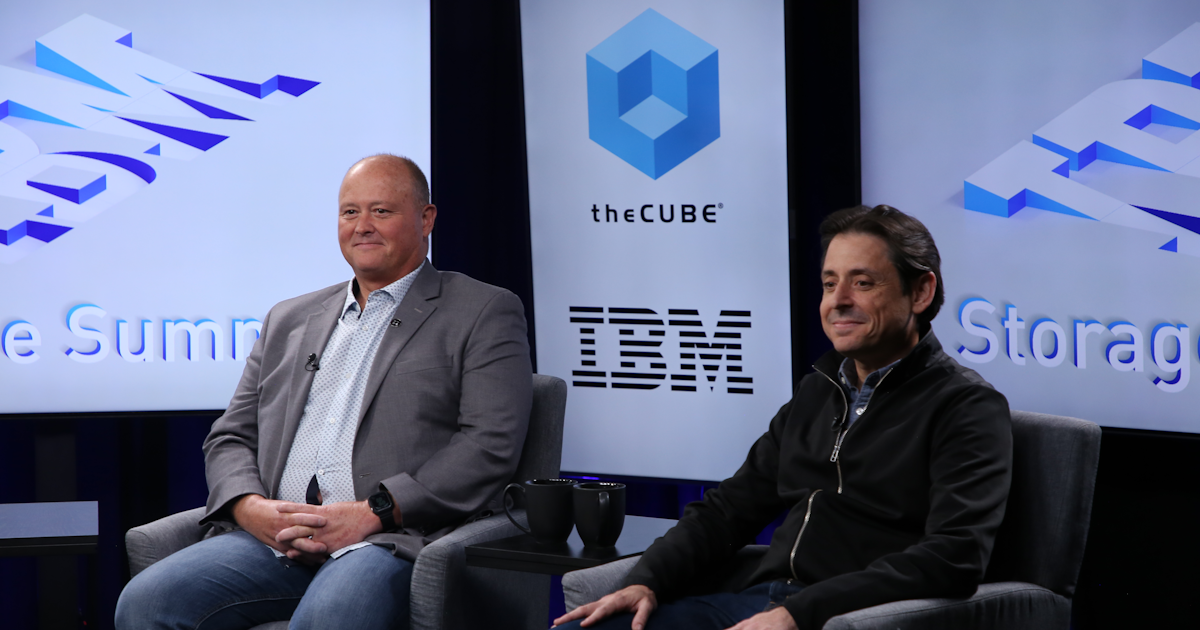 AI
AI
 AI
AI
 AI
AI
The world of storage has undergone a remarkable transformation, from simple bit buckets to intelligent systems that play a pivotal role in shaping modern data strategies.
The shift toward software-led storage has not only accelerated innovation, but also brought cloud-like experiences to on-premises and hybrid environments. As data takes center stage in the digital age, businesses are realizing that storage is not just about preserving data; it’s about unlocking its true value with the power of artificial intelligence.
“Although storage has presented itself mainly as a background service, it’s becoming more and more forefront in the consideration for what an appropriate data strategy needs to look like,” said Scott Baker (pictured, left), chief marketing officer and vice president of IBM Infrastructure Portfolio product marketing at IBM Corp. “The future of storage is expected to be characterized by the extensive use of AI to unlock data value and provide a solid foundation for businesses to anticipate and withstand market shifts.”
Baker, along with Sam Werner (right), vice president of IBM Storage product management at IBM, spoke with theCUBE industry analysts Dave Vellante and Rob Strechay at the IBM Storage Summit, during an exclusive broadcast on theCUBE, SiliconANGLE Media’s livestreaming studio. They shared their insights on the future of storage and how AI is revolutionizing the industry. (* Disclosure below.)
Storage is not just about holding onto data; it plays a critical role in assessing the referential value of data and setting up defenses to safeguard against breaches and intrusions, according to Baker. Storage is no longer a background service but a forefront consideration in developing a robust data strategy for organizations. With the growing importance of data in the overall information supply chain, storage becomes integral in supporting businesses’ information needs.
“Nobody likes to talk about the fact that they’ve been breached,” Baker said. “Getting a customer to step up and say, ‘I was breached,’ can be a little tricky to do. But all in all, what we’re beginning to see here is that more often the security office is getting involved in the kind of decisions that are getting made.”
There are three major challenges faced by storage administrators, according to Werner. First, with the adoption of cloud-native architectures and containerization, they need to build an elastic infrastructure that supports modern development models while ensuring high levels of availability and data resilience. Second, the explosive growth of unstructured data in diverse locations, including edge, core data centers and the cloud poses challenges in managing and leveraging this data effectively. Lastly, the rise of targeted cyberattacks necessitates new approaches to protect against hardware failures, logical data corruption and malicious intrusions.
“We’re trying to help the storage administrators figure out how to bring all that together,” Werner said. “Threats have gotten so much more significant … now you have targeted attacks come in, it’s completely different how you recover.”
AI is playing a pivotal role in reshaping the storage landscape, according to Werner and Baker. IBM is at the forefront of operationalizing AI within its storage products. The implementation of AIOps simplifies storage infrastructure management, ensuring uptime and preventing disruptions.
“We’re up to over 75% accuracy in detecting anomalies or per potential problems within our storage. But now we’ve taken it even further,” Werner said. “We’re able to move into near real-time detection of anomalies in your I/O to potentially catch a ransomware attack before it spreads across your storage environment.”
Operationalizing AI is critical for its widespread adoption, where AI becomes an inherent part of storage systems, continuously monitoring and correlating data to ensure protection and recovery. This approach ensures a more consultative engagement with companies, helping them identify and address risks and gaps related to cyber resilience and data governance.
“If you think about AI as a workload, it’s no different than any other workload that would run on storage. It just happens to be both performance intensive as well as capacity sensitive,” Baker stated. “What we’re really trying to drive for is the foundation you need from an infrastructure perspective that provides the equivalent of a cloud architecture you can deploy on-prem that runs consistently in the cloud and will help organizations operationalize their AI investment.”
Here’s the complete video interview, part of SiliconANGLE’s and theCUBE’s coverage of the IBM Storage Summit:
(* Disclosure: TheCUBE is a paid media partner for the IBM Storage Summit. Neither IBM Corp., the sponsor of theCUBE’s event coverage, nor other sponsors have editorial control over content on theCUBE or SiliconANGLE.)
Support our mission to keep content open and free by engaging with theCUBE community. Join theCUBE’s Alumni Trust Network, where technology leaders connect, share intelligence and create opportunities.
Founded by tech visionaries John Furrier and Dave Vellante, SiliconANGLE Media has built a dynamic ecosystem of industry-leading digital media brands that reach 15+ million elite tech professionals. Our new proprietary theCUBE AI Video Cloud is breaking ground in audience interaction, leveraging theCUBEai.com neural network to help technology companies make data-driven decisions and stay at the forefront of industry conversations.